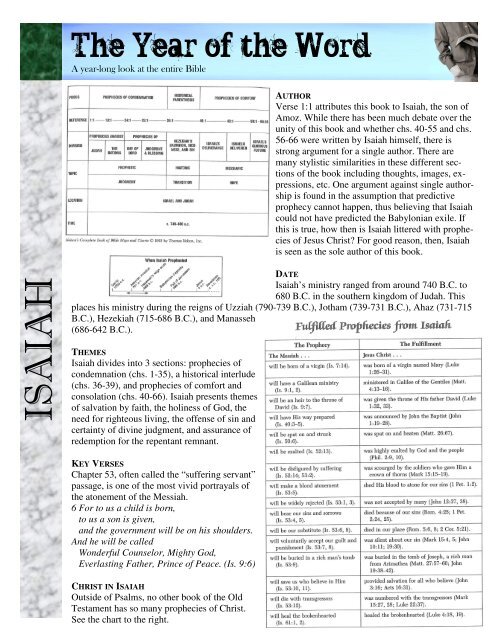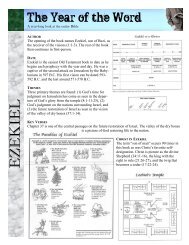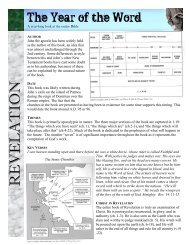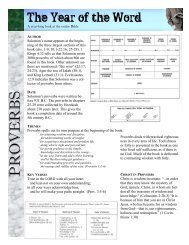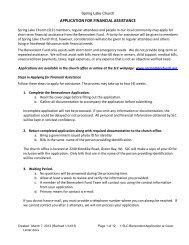YITW Sheet #21--Isaiah and Micah.pub - Spring Lake Church
YITW Sheet #21--Isaiah and Micah.pub - Spring Lake Church
YITW Sheet #21--Isaiah and Micah.pub - Spring Lake Church
You also want an ePaper? Increase the reach of your titles
YUMPU automatically turns print PDFs into web optimized ePapers that Google loves.
The Year of the Word<br />
A year-long look at the entire Bible<br />
AUTHOR<br />
Verse 1:1 attributes this book to <strong>Isaiah</strong>, the son of<br />
Amoz. While there has been much debate over the<br />
unity of this book <strong>and</strong> whether chs. 40-55 <strong>and</strong> chs.<br />
56-66 were written by <strong>Isaiah</strong> himself, there is<br />
strong argument for a single author. There are<br />
many stylistic similarities in these different sections<br />
of the book including thoughts, images, expressions,<br />
etc. One argument against single authorship<br />
is found in the assumption that predictive<br />
prophecy cannot happen, thus believing that <strong>Isaiah</strong><br />
could not have predicted the Babylonian exile. If<br />
this is true, how then is <strong>Isaiah</strong> littered with prophecies<br />
of Jesus Christ? For good reason, then, <strong>Isaiah</strong><br />
is seen as the sole author of this book.<br />
ISAIAH<br />
DATE<br />
<strong>Isaiah</strong>’s ministry ranged from around 740 B.C. to<br />
680 B.C. in the southern kingdom of Judah. This<br />
places his ministry during the reigns of Uzziah (790-739 B.C.), Jotham (739-731 B.C.), Ahaz (731-715<br />
B.C.), Hezekiah (715-686 B.C.), <strong>and</strong> Manasseh<br />
(686-642 B.C.).<br />
THEMES<br />
<strong>Isaiah</strong> divides into 3 sections: prophecies of<br />
condemnation (chs. 1-35), a historical interlude<br />
(chs. 36-39), <strong>and</strong> prophecies of comfort <strong>and</strong><br />
consolation (chs. 40-66). <strong>Isaiah</strong> presents themes<br />
of salvation by faith, the holiness of God, the<br />
need for righteous living, the offense of sin <strong>and</strong><br />
certainty of divine judgment, <strong>and</strong> assurance of<br />
redemption for the repentant remnant.<br />
KEY VERSES<br />
Chapter 53, often called the “suffering servant”<br />
passage, is one of the most vivid portrayals of<br />
the atonement of the Messiah.<br />
6 For to us a child is born,<br />
to us a son is given,<br />
<strong>and</strong> the government will be on his shoulders.<br />
And he will be called<br />
Wonderful Counselor, Mighty God,<br />
Everlasting Father, Prince of Peace. (Is. 9:6)<br />
CHRIST IN ISAIAH<br />
Outside of Psalms, no other book of the Old<br />
Testament has so many prophecies of Christ.<br />
See the chart to the right.
The Year of the Word<br />
A year-long look at the entire Bible<br />
AUTHOR<br />
<strong>Micah</strong>, like Amos, was a man of<br />
the country. He lived in Moresheth<br />
Gath (1:14) which was located 20<br />
miles southwest of Jerusalem. His<br />
name means “Who is like the<br />
Lord?”. He was a contemporary of<br />
Hosea, Amos, <strong>Isaiah</strong>, <strong>and</strong> Jonah.<br />
MICAH<br />
DATE<br />
<strong>Micah</strong> 1:1 indicates that <strong>Micah</strong><br />
prophesied in the days of Jotham<br />
(739-731 B.C.), Ahaz (731-715<br />
B.C.), <strong>and</strong> Hezekiah (715-686<br />
B.C.) in the southern kingdom of<br />
Judah. His strong statements<br />
against idolatry <strong>and</strong> immorality<br />
likely place most of his ministry<br />
prior to the reforms of Hezekiah.<br />
Thus, his ministry ranged from<br />
about 735 to 710 B.C.<br />
THEMES<br />
The message of <strong>Micah</strong> is remarkably<br />
similar to that of <strong>Isaiah</strong>. <strong>Micah</strong><br />
calls out the people of Judah (<strong>and</strong><br />
Israel) for their refusal to take care of their covenant responsibilities. He points out the oppression of<br />
the poor <strong>and</strong> the corruption of the political <strong>and</strong> religious leaders. Promises of restoration are also included,<br />
but only on the other side of impending judgment.<br />
KEY VERSES<br />
He has showed you, O man, what is good.<br />
And what does the LORD require of you?<br />
To act justly <strong>and</strong> to love mercy<br />
<strong>and</strong> to walk humbly with your God. (<strong>Micah</strong> 6:8)<br />
Chapters 6 <strong>and</strong> 7 describe a courtroom scene where God brings His charges against Judah for their<br />
empty ritual, injustice, <strong>and</strong> corruption. The verdict: guilty.<br />
CHRIST IN MICAH<br />
<strong>Micah</strong> 5:2 is one of the most important prophecies in the whole Old Testament.<br />
“But you, Bethlehem Ephrathah,<br />
though you are small among the clans of Judah,<br />
out of you will come for me<br />
one who will be ruler over Israel,<br />
whose origins are from of old,<br />
from ancient times.”<br />
Here, the birthplace <strong>and</strong> eternity of Messiah are seen clearly.
ISAIAH <strong>and</strong> MICAH<br />
An overview of the entire book of <strong>Isaiah</strong> can be found in the first 20 verses of chapter 1. Let’s examine this<br />
passage to get at the major themes of <strong>Isaiah</strong>. Read this section as a group (<strong>Isaiah</strong> 1:1-20) <strong>and</strong> make some of<br />
your own observations. Zero in on the following verses to help your discussion along:<br />
1:3 – What is God’s complaint towards Judah? What is He implying with comparisons of His people to farm<br />
animals?<br />
1:4 – What has happened to the people? Notice the imagery in verses 5 & 6. Why is this appropriate imagery?<br />
1:7 – What will happen to the people?<br />
1:12-15 – What is the problem that God reveals in this section? In what ways do these same problems<br />
manifest themselves in the <strong>Church</strong> of today?<br />
1:16-20 – There is a solution! Where does the solution begin <strong>and</strong> what is its end result?<br />
For reflection <strong>and</strong> discussion:<br />
If God were to send a prophet to speak in to your life, what might you hear?<br />
Are there areas of less than full devotion to God?<br />
How might these areas be negatively impacting your life?<br />
Is there a way out?<br />
________________________________________________________________________<br />
<strong>Isaiah</strong> is known to be a book of direct <strong>and</strong> straight forward judgment. Yet it is counterbalanced with the<br />
coming hope of the Messiah <strong>and</strong> God’s long-term plan for His people, both individually <strong>and</strong> as a nation. <strong>Isaiah</strong><br />
is mentioned by name 20 times in the NT, <strong>and</strong> is quoted extensively as the message in the book is the same<br />
Gospel (Good News) preached by Jesus <strong>and</strong> his followers.<br />
What do the following passages in <strong>Isaiah</strong> teach us about God’s plan? Comment on both the plan that was<br />
fulfilled in Christ, <strong>and</strong> God’s plan that is yet unfolding.<br />
42:1-9<br />
61:1-3<br />
63:1-6 – What is going on in this passage…what is the day of vengeance of the Lord?<br />
In the end, God will make all things new <strong>and</strong> right. For that Day we wait <strong>and</strong> have great hope. Stay close to<br />
God <strong>and</strong> address everything that attempts to seduce you away from the God who loves you!<br />
PREPARATION FOR NEXT WEEK: READ HABAKKUK, ZEPHANIAH, JOEL


